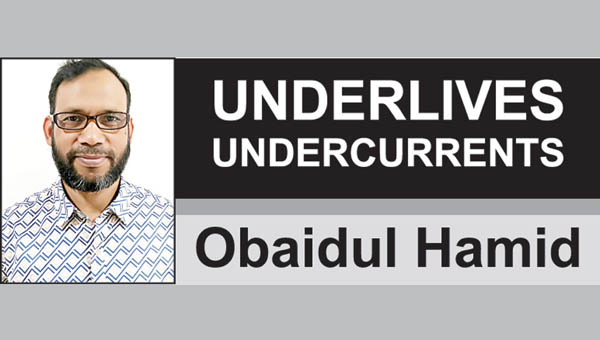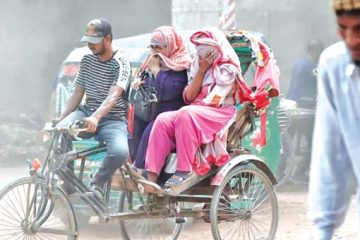Opinion
By Obaidul Hamid
RAMNA Park in Dhaka is a place for me to go every time I travel to the city. I do my regular exercise in this large remaining green space in the otherwise concretised urban jungle. It was no exception during my most recent trip to Bangladesh.
I was walking back to my short-term accommodation after my usual dose of exercise in Ramna Park. The sunny September morning drenched my running gear as I finished two rounds of my medium-pace run around the park.
Coming out of the park, I bought some vegetables from Bayley Road, which was narrowed by temporary vendors of vegetables, fruits, and groceries. I was feeling rather uncomfortable walking in my sweaty clothes, with both my hands occupied. I approached an empty rickshaw standing nearby. Before telling the driver my destination, I checked with him if he was ok to carry a passenger who was drenched in sweat. His response was memorable: ‘Aren’t you a human being? I don’t have any problem in taking you wherever you would like to go.’
I then noticed that he was a single-handed man. His right hand was missing a few inches below the elbow. As I climbed the rickshaw, he told me that I could also have avoided him and looked for another rickshaw, thinking that he was a one-handed man. As he rode me towards my destination, I asked him about his home and family. I was pleased to hear that two of his children were studying at tertiary institutions after high school. When I asked him about his own education, he said that he had gone to school for several days and that was all his formal education. He informed me that he could write his name.
In response to my question, he also told me that he had lost his hand when he was working as a masonry worker. That was 19 years ago, he said. As he was probably in his fifties, he has lived more than half of his working life with his only hand.
I was curious to hear how difficult it was for him to do things with one hand. He said it was indeed not easy. Pulling the rickshaw must be tough with a single hand. I remember I had once tried to see if I could drive a rickshaw during my high school days. I discovered that it had a mind of its own, and it tended to go in one direction.
I asked the rickshaw driver if he was angry or unhappy about losing one hand and living a hard life with the remaining one. He said that he usually feels hurt when other drivers on the road lose patience with him. Maybe he was slow to move or give way or change direction. Rarely would anyone sympathise with him, he said. Instead, they shouted at him for his incompetence or slow movement. The man who was full of humanity was occasionally subjected to inhuman treatment by others, in which his physical disability didn’t count.
To me, rickshaw pullers in Dhaka serve as authentic sources of information about life and society. They can also provide first-hand information about politics in the country. Literally, they live most of their living lives on the street. As Bangladeshi politics cannot be imagined without the streets, they can provide what we call ‘an insider perspective’. They can be critical informers for social scientists who want to find out how life is lived by the marginalised and the downtrodden in society.
This one-handed rickshaw driver gave me a lesson in humanity. He didn’t go to school; he didn’t study humanities as a subject. However, he had no deficiency in his understanding or practice of humanity.
This man’s untutored humanity reminded me of the crisis of humanity that the world is going through right now. What has been done to the Palestinians by Israeli genocidal forces with material and non-material support from the West and the silent endorsement by cowed Muslim nations in the region is a glaring example of the fall of humanity. Governments and institutions have allowed children, women, and other people to be killed in thousands in the most merciless manner. People in Gaza have been starved to death. Instead of stopping this genocide, the American government is taking unbelievable measures against those who are in favour of humanity, justice, and international law.
It’s common people who seem to have been left with traces of humanity. They are the ones who are calling for an end to the genocide from different parts of the world. However, they can exercise their power only in the streets. Although this popular power cannot be undermined, it may not be strong enough to fully convince their governments to do something about the genocide that is happening in front of the eyes of the world. Occasionally, some governments declare firm stances against Israel’s genocide. However, there seem to be limited effects of such rhetoric on the ground.
In such a strange world, humanity can be found only from below. The one-handed rickshaw puller’s sense of humanity reminds me of those protesting the genocide in the streets. They are the remaining custodians of humanity, which may have been lost at macro or institutional levels.
I wondered whether it’s the disability of the rickshaw puller which made him extra sensitive about humanity. To test my hypothesis, I repeated my social experiment a few days later.
Drenched in sweat after my exercise in Ramna Park, I looked for the one-handed rickshaw driver again in the same place. I couldn’t find him. I then approached another man and asked him if he would ride me to my place, showing him my drenched clothes. The only answer that he gave me was ‘No problem’. He rode me to my shelter through the crowded road. However, I didn’t feel encouraged to ask him about his life or his view of humanity.
As I entered the residential building, I asked myself if people with disabilities had more sympathy for others than those of us who are ‘able’ and ‘normal’.
Obaidul Hamid is an associate professor at the University of Queensland in Australia. He researches language, education, and society in the developing world. He is a co-editor of Current Issues in Language Planning.







